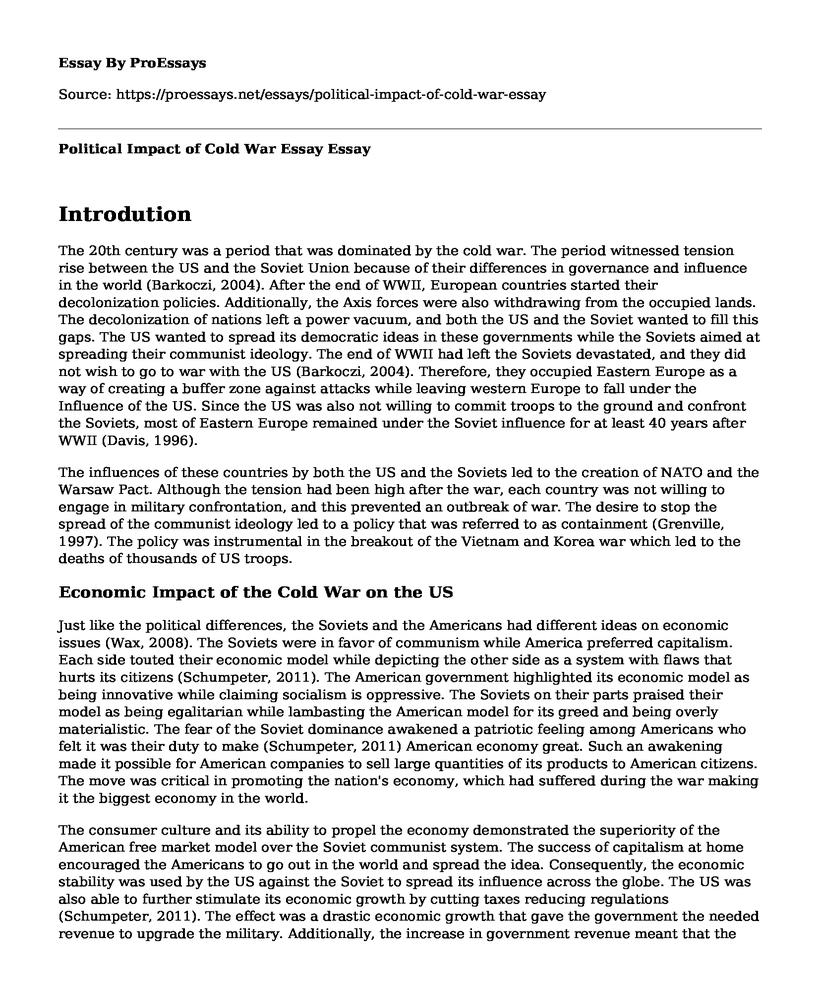Introdution
The 20th century was a period that was dominated by the cold war. The period witnessed tension rise between the US and the Soviet Union because of their differences in governance and influence in the world (Barkoczi, 2004). After the end of WWII, European countries started their decolonization policies. Additionally, the Axis forces were also withdrawing from the occupied lands. The decolonization of nations left a power vacuum, and both the US and the Soviet wanted to fill this gaps. The US wanted to spread its democratic ideas in these governments while the Soviets aimed at spreading their communist ideology. The end of WWII had left the Soviets devastated, and they did not wish to go to war with the US (Barkoczi, 2004). Therefore, they occupied Eastern Europe as a way of creating a buffer zone against attacks while leaving western Europe to fall under the Influence of the US. Since the US was also not willing to commit troops to the ground and confront the Soviets, most of Eastern Europe remained under the Soviet influence for at least 40 years after WWII (Davis, 1996).
The influences of these countries by both the US and the Soviets led to the creation of NATO and the Warsaw Pact. Although the tension had been high after the war, each country was not willing to engage in military confrontation, and this prevented an outbreak of war. The desire to stop the spread of the communist ideology led to a policy that was referred to as containment (Grenville, 1997). The policy was instrumental in the breakout of the Vietnam and Korea war which led to the deaths of thousands of US troops.
Economic Impact of the Cold War on the US
Just like the political differences, the Soviets and the Americans had different ideas on economic issues (Wax, 2008). The Soviets were in favor of communism while America preferred capitalism. Each side touted their economic model while depicting the other side as a system with flaws that hurts its citizens (Schumpeter, 2011). The American government highlighted its economic model as being innovative while claiming socialism is oppressive. The Soviets on their parts praised their model as being egalitarian while lambasting the American model for its greed and being overly materialistic. The fear of the Soviet dominance awakened a patriotic feeling among Americans who felt it was their duty to make (Schumpeter, 2011) American economy great. Such an awakening made it possible for American companies to sell large quantities of its products to American citizens. The move was critical in promoting the nation's economy, which had suffered during the war making it the biggest economy in the world.
The consumer culture and its ability to propel the economy demonstrated the superiority of the American free market model over the Soviet communist system. The success of capitalism at home encouraged the Americans to go out in the world and spread the idea. Consequently, the economic stability was used by the US against the Soviet to spread its influence across the globe. The US was also able to further stimulate its economic growth by cutting taxes reducing regulations (Schumpeter, 2011). The effect was a drastic economic growth that gave the government the needed revenue to upgrade the military. Additionally, the increase in government revenue meant that the US could send millions of dollars in military aid to its allies. The Soviets wanted to support their allies just like the US a decision that led to its bankruptcy and its final collapse.
References
Barkoczi, L. (2004). Hungary in the Cold War 1945-1956: Between the United States and the Soviet Union. Budapest: Central European University Press.
Davis, M. J. (1996). Security issues in the post-cold war world. Cheltenham, UK: Edward Elgar.
Grenville, J. A. (1997). A history of the world in the twentieth century. Cambridge, MA: Belknap Press of Harvard University Press.
Schumpeter, J. A. (2011). Capitalism, socialism, and democracy. Mansfield Centre, CT: Martino.
Wax, D. M. (2008). Anthropology at the dawn of the Cold War: The influence of foundations, McCarthyism, and the CIA. London: Pluto Press.
Cite this page
Political Impact of Cold War Essay. (2022, May 06). Retrieved from https://proessays.net/essays/political-impact-of-cold-war-essay
If you are the original author of this essay and no longer wish to have it published on the ProEssays website, please click below to request its removal:
- Rome: Virgil and Ovid - Essay Sample
- Essay Sample on Holocaust: Trauma & Unbearable Stress Beyond Human Coping
- Essay Sample on Rise of Roman Empire: Prophecy, Power, and Passion
- Essay Sample on Colonial Americans & Beer: Brewing Tradition Since 16th Century
- Essay Example on Septuagint: Ancient Greek Translation of the Bible
- Essay Example on Michelle Obama: A Symbol of Hope and Realistic Change
- The Berlin Wall: Symbol of the Iron Curtain Divide - Essay Sample







